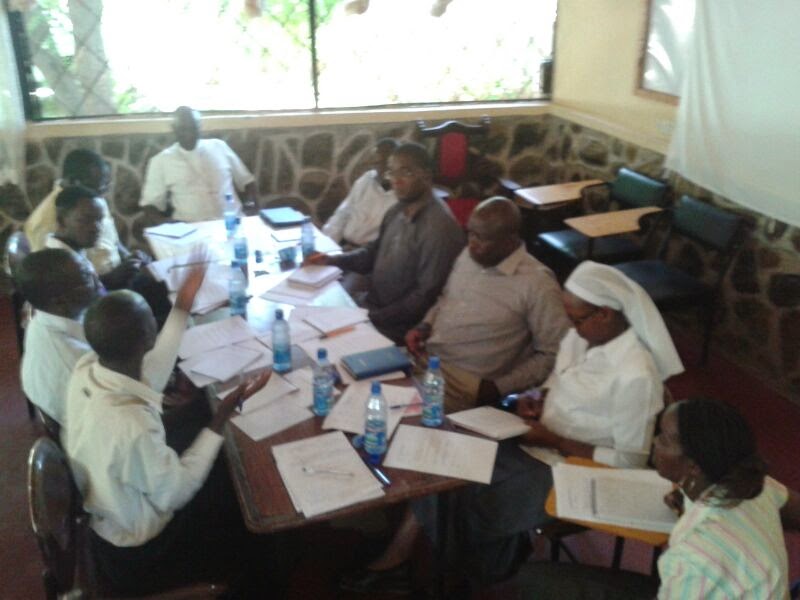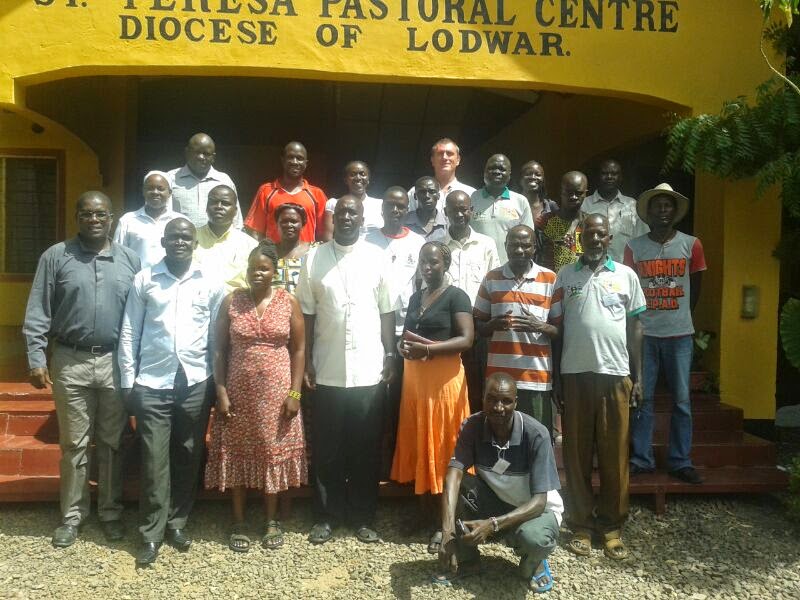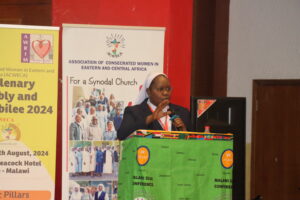KENYA: AMECEA Commitment to Inter-Diocesan Peace and Cross-Border Evangelization

 |
| Participants of the Executive Committee Meeting in session |
AMECEA
Pastoral Department through the Coordinator Fr. Febian Pikiti Mulenga
participated in the follow-up Executive Committee meeting on the 2nd
Conference of the Inter-Diocesan Peace and Cross-Border Evangelization Initiative
which took place in December 2013.
Pastoral Department through the Coordinator Fr. Febian Pikiti Mulenga
participated in the follow-up Executive Committee meeting on the 2nd
Conference of the Inter-Diocesan Peace and Cross-Border Evangelization Initiative
which took place in December 2013.
The Inter-Diocesan
Peace and Cross-Border Evangelization Initiative was forged in order to harness
efforts to enhance the Gospel way of promoting peace, co-existence and integral
human development among the people in the Turkana – Karamajong. The impact of
chronic conflicts, marginalization, poverty, harsh semi-desert climate,
conflict over meager resources and lack of access of essential basic needs
continue to affected many communities in this region. It is for this reason
that Catholic Dioceses in the region, under the auspices of AMECEA resolved to
collectively response to the needs of the people with the context of the
pastoral ministry of the Church.
Peace and Cross-Border Evangelization Initiative was forged in order to harness
efforts to enhance the Gospel way of promoting peace, co-existence and integral
human development among the people in the Turkana – Karamajong. The impact of
chronic conflicts, marginalization, poverty, harsh semi-desert climate,
conflict over meager resources and lack of access of essential basic needs
continue to affected many communities in this region. It is for this reason
that Catholic Dioceses in the region, under the auspices of AMECEA resolved to
collectively response to the needs of the people with the context of the
pastoral ministry of the Church.
The AMECEA
Pastoral Coordinator, Fr. Febian Pikiti Mulenga, attended the meeting of the
Executive Committee which took place on 30th April, 2014 at St.
Theresa Pastoral Centre in Lodwar, Kenya. The meeting was opened by the Bishop
of Lodwar, Right Rev. Dominic Kemingich and was attended by representatives
from the following dioceses of AMECEA: Kitale, Nakuru, Lodwar (Kenya), Kotido,
Moroto (Uganda), Torit (South Sudan) and Jimma-Bonga (Ethiopia).
Pastoral Coordinator, Fr. Febian Pikiti Mulenga, attended the meeting of the
Executive Committee which took place on 30th April, 2014 at St.
Theresa Pastoral Centre in Lodwar, Kenya. The meeting was opened by the Bishop
of Lodwar, Right Rev. Dominic Kemingich and was attended by representatives
from the following dioceses of AMECEA: Kitale, Nakuru, Lodwar (Kenya), Kotido,
Moroto (Uganda), Torit (South Sudan) and Jimma-Bonga (Ethiopia).
In his
opening remarks, Bishop Kimengich expressed gratitude to all the participating
dioceses in this initiative that is aimed at promoting sustainable peace within
the context of the Church mission of Evangelization. He said, “God has
continued to work through the efforts we are making in the region to promote
peaceful co-existence among the different ethnic groupings in the region. Since
we started this initiative, there is a considerable reduction in cattle
raiding, community conflicts and forced displacement because of insecurity. We
need to continue making a difference using the Gospel approach to our
initiative.”
opening remarks, Bishop Kimengich expressed gratitude to all the participating
dioceses in this initiative that is aimed at promoting sustainable peace within
the context of the Church mission of Evangelization. He said, “God has
continued to work through the efforts we are making in the region to promote
peaceful co-existence among the different ethnic groupings in the region. Since
we started this initiative, there is a considerable reduction in cattle
raiding, community conflicts and forced displacement because of insecurity. We
need to continue making a difference using the Gospel approach to our
initiative.”
During the
meeting, representatives from the participating dioceses reported on the
connector activities and initiatives that bring together rival communities to
discuss or plan on ways of promoting peaceful co-existence in their
communities. Connector activities included meeting with civic authorities,
security leaders of the government, elders of local communities and Church
leaders to discuss ways of harnessing efforts together that can promote
security, education, health/sanitation and pastoral out-reach to the people.
meeting, representatives from the participating dioceses reported on the
connector activities and initiatives that bring together rival communities to
discuss or plan on ways of promoting peaceful co-existence in their
communities. Connector activities included meeting with civic authorities,
security leaders of the government, elders of local communities and Church
leaders to discuss ways of harnessing efforts together that can promote
security, education, health/sanitation and pastoral out-reach to the people.
 |
| Group Photo of the Participants of the Executive Meeting |
The meeting
further looked at the proposed Memorandum of Understanding among the
participating dioceses which will be a guide in designing and implementing
connector or common activities that would promote cross-border peace and
evangelization. The MOU will be presented to the Bishops and later be signed
under the auspices of AMECEA.
further looked at the proposed Memorandum of Understanding among the
participating dioceses which will be a guide in designing and implementing
connector or common activities that would promote cross-border peace and
evangelization. The MOU will be presented to the Bishops and later be signed
under the auspices of AMECEA.
Since the
ethnic communities in the Turkana-Karamajong cloister live across the borders
of countries in the region, a collective approach by the neighboring dioceses
will ensure sustainable peace, development and effective pastoral care in the
region.
ethnic communities in the Turkana-Karamajong cloister live across the borders
of countries in the region, a collective approach by the neighboring dioceses
will ensure sustainable peace, development and effective pastoral care in the
region.
In addition
to the MOU, the Executive Committee looked at the five years Strategic Plan
that was proposed in December 2013 during the 2nd Inter-Diocesan
Peace and Cross-Border Evangelization Conference. The Strategic Plan proposes
connector activities and projects that will enhance promoting a comprehensive
and collective response to the pastoral needs of the People of God in the
Turkana – Karamajong cloister.
to the MOU, the Executive Committee looked at the five years Strategic Plan
that was proposed in December 2013 during the 2nd Inter-Diocesan
Peace and Cross-Border Evangelization Conference. The Strategic Plan proposes
connector activities and projects that will enhance promoting a comprehensive
and collective response to the pastoral needs of the People of God in the
Turkana – Karamajong cloister.
At the end
of the meeting, the AMECEA Pastoral Co-coordinator re-affirmed the commitment
of the AMECEA Secretariat to continue the collaborative role in bringing
together the AMECEA member dioceses to address the common pastoral needs. He
said, “To address the overwhelming and complex nature of the issues affecting
our communities in this region, we need a collective and concerted effort in
the light of the teaching of the Gospel of Christ. In this way sustainable
peace, integral development and pastoral ministry will bring about transformation
of the lives of our people.”
of the meeting, the AMECEA Pastoral Co-coordinator re-affirmed the commitment
of the AMECEA Secretariat to continue the collaborative role in bringing
together the AMECEA member dioceses to address the common pastoral needs. He
said, “To address the overwhelming and complex nature of the issues affecting
our communities in this region, we need a collective and concerted effort in
the light of the teaching of the Gospel of Christ. In this way sustainable
peace, integral development and pastoral ministry will bring about transformation
of the lives of our people.”
Source: AMECEA Pastoral Department.


